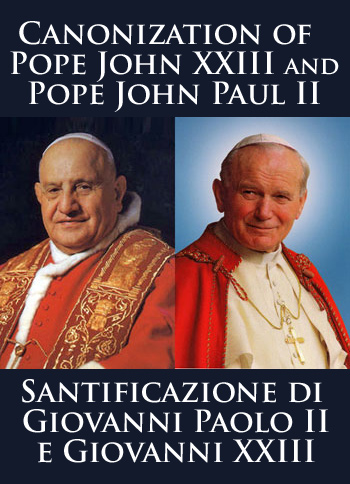For those whose sins you forgive, they are forgiven; for those whose sins you retain, they are retained.’ (John 20:23)

This is an historic weekend, as on Sunday both John Paul II and John XXIII are raised to the altars of the Church, as they say, or are canonised, or, to put it most simply and most obviously (though least accurately) made saints.
Actually they are not being made saints at all. Though from this weekend we will call them “Saint John Paul II” and “Saint John XXIII”, what the Church does is not make them saints, but rather recognise them as saints.
In Scripture all faithful believers are saints. When St Paul writes to the churches he addresses them all as saints - “to the saints in Rome”, “the saints in Corinth”, “the saints in Ephesus”. In fact St Paul uses the word 39 times. And each time it a reference to the living. Paul never uses the word “Christian” nor indeed “Catholic” - everyone is just a saint.
But this doesn’t mean that everyone in the Church was good, or perfect. Paul’s letters to the saints often chide and rebuke them. He points to their failings, and challenges them to greater virtue.
And even though they were all saints, he tells them that are also, all of them, sinners. “All have sinned and fall short of the glory of God,” he says (Romans 3:23).
So how can they be saints, none the less?
We might say nowadays, with some good reason, that he is using the word in a different way. He does not mean “saint” in the way we, and indeed the Church uses it. But do not be too hasty, because Paul continues “they are now justified by his grace as a gift, through the redemption that is in Christ Jesus” (Rom 3:24). They are saints, we are saints, not because they are perfect, but because they know the need of God’s grace. This is the forgiveness of sins which we hear of in today’s Gospel. This is the Divine Mercy, which gives its name to this day, the devotion which was so important to Saint John Paul II.
So the Saint is not the one who lives the perfect and blameless life. No. The Saints are the ones who know their need of the Divine Mercy. It is only by knowing our need of God’s mercy that we can receive it, but if we close our hearts and say we have no sin, then, as Saint John says “we deceive ourselves, and the truth is not in us” (1 John 1:7) This is what holiness means - to know our need of God.
Now when the Church recognises someone as a saint, she is telling us two things about them. That in the holiness of their lives on earth they can be an example to us, and that in the holiness they enjoy in heaven, we can call upon them for their prayers. Both of these are important. They are not just holy celebrities, the heroes of faith, story book inspirations - but they are part of what the letter to the Hebrews calls the great cloud of witnesses who encourage in the struggle of the Christian life, as an example of how a good life may be lived - and by their continuing prayers for us as we are bound together in God’s mercy.
And the Church here provides us with two saints who we knew in this life. Most of us will remember Pope John Paul II - and many of you will also recall John XXIII - good Pope John, as he was often called. We have seen them, not just on television - but in real life. They enthused us, inspired us, encouraged us, and gave us a sense of God’s presence and his love. They are certainly towering figures in our faith, and important in the life and history of the Church in recent times.
Yet they are commended to us not because they were perfect, or flawless, or always right - but because the Church recognises that the Divine Mercy shone through them in this life, and that God has perfected them in the next.
